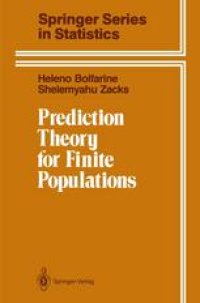
Ebook: Prediction Theory for Finite Populations
- Tags: Statistics general
- Series: Springer Series in Statistics
- Year: 1992
- Publisher: Springer-Verlag New York
- Edition: 1
- Language: English
- pdf
A large number of papers have appeared in the last twenty years on estimating and predicting characteristics of finite populations. This monograph is designed to present this modern theory in a systematic and consistent manner. The authors' approach is that of superpopulation models in which values of the population elements are considered as random variables having joint distributions. Throughout, the emphasis is on the analysis of data rather than on the design of samples. Topics covered include: optimal predictors for various superpopulation models, Bayes, minimax, and maximum likelihood predictors, classical and Bayesian prediction intervals, model robustness, and models with measurement errors. Each chapter contains numerous examples, and exercises which extend and illustrate the themes in the text. As a result, this book will be ideal for all those research workers seeking an up-to-date and well-referenced introduction to the subject.
A large number of papers have appeared in the last twenty years on estimating and predicting characteristics of finite populations. This monograph is designed to present this modern theory in a systematic and consistent manner. The authors' approach is that of superpopulation models in which values of the population elements are considered as random variables having joint distributions. Throughout, the emphasis is on the analysis of data rather than on the design of samples. Topics covered include: optimal predictors for various superpopulation models, Bayes, minimax, and maximum likelihood predictors, classical and Bayesian prediction intervals, model robustness, and models with measurement errors. Each chapter contains numerous examples, and exercises which extend and illustrate the themes in the text. As a result, this book will be ideal for all those research workers seeking an up-to-date and well-referenced introduction to the subject.
A large number of papers have appeared in the last twenty years on estimating and predicting characteristics of finite populations. This monograph is designed to present this modern theory in a systematic and consistent manner. The authors' approach is that of superpopulation models in which values of the population elements are considered as random variables having joint distributions. Throughout, the emphasis is on the analysis of data rather than on the design of samples. Topics covered include: optimal predictors for various superpopulation models, Bayes, minimax, and maximum likelihood predictors, classical and Bayesian prediction intervals, model robustness, and models with measurement errors. Each chapter contains numerous examples, and exercises which extend and illustrate the themes in the text. As a result, this book will be ideal for all those research workers seeking an up-to-date and well-referenced introduction to the subject.
Content:
Front Matter....Pages i-xi
Synopsis....Pages 1-4
Basic Ideas and Principles....Pages 5-22
Optimal Predictors of Population Quantities....Pages 23-65
Bayes and Minimax Predictors....Pages 66-98
Maximum—Likelihood Predictors....Pages 99-118
Classical and Bayesian Prediction Intervals....Pages 119-127
The Effects of Model Misspecification, Conditions for Robustness, and Bayesian Modeling....Pages 128-149
Models with Measurement Errors....Pages 150-168
Asymptotic Properties in Finite Populations....Pages 169-181
Design Characteristics of Predictors....Pages 182-192
Back Matter....Pages 193-209
A large number of papers have appeared in the last twenty years on estimating and predicting characteristics of finite populations. This monograph is designed to present this modern theory in a systematic and consistent manner. The authors' approach is that of superpopulation models in which values of the population elements are considered as random variables having joint distributions. Throughout, the emphasis is on the analysis of data rather than on the design of samples. Topics covered include: optimal predictors for various superpopulation models, Bayes, minimax, and maximum likelihood predictors, classical and Bayesian prediction intervals, model robustness, and models with measurement errors. Each chapter contains numerous examples, and exercises which extend and illustrate the themes in the text. As a result, this book will be ideal for all those research workers seeking an up-to-date and well-referenced introduction to the subject.
Content:
Front Matter....Pages i-xi
Synopsis....Pages 1-4
Basic Ideas and Principles....Pages 5-22
Optimal Predictors of Population Quantities....Pages 23-65
Bayes and Minimax Predictors....Pages 66-98
Maximum—Likelihood Predictors....Pages 99-118
Classical and Bayesian Prediction Intervals....Pages 119-127
The Effects of Model Misspecification, Conditions for Robustness, and Bayesian Modeling....Pages 128-149
Models with Measurement Errors....Pages 150-168
Asymptotic Properties in Finite Populations....Pages 169-181
Design Characteristics of Predictors....Pages 182-192
Back Matter....Pages 193-209
....